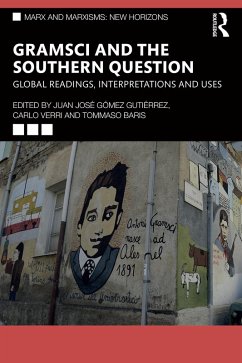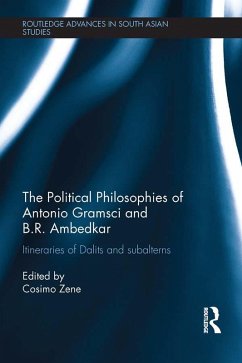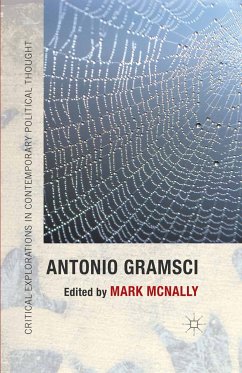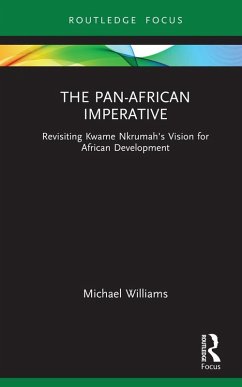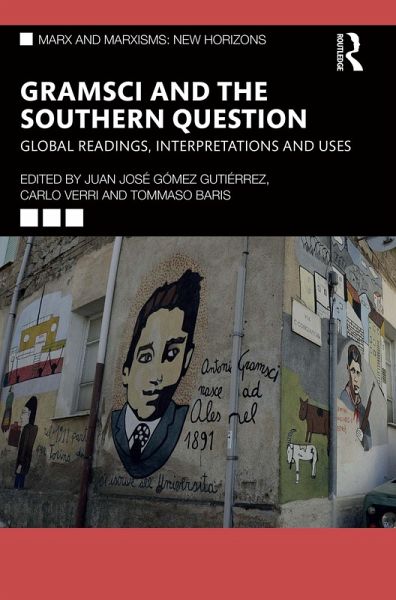
Gramsci and the Southern Question (eBook, PDF)
Global Readings, Interpretations and Uses
Redaktion: Gómez Gutiérrez, Juan José; Baris, Tommaso; Verri, Carlo
Versandkostenfrei!
Sofort per Download lieferbar
39,95 €
inkl. MwSt.
Weitere Ausgaben:

PAYBACK Punkte
20 °P sammeln!
This book looks at the Southern question in Antonio Gramsci. It takes this as an opportunity to reflect on the special nature of his thought, linked to the concepts of hegemony, subalternity and the critique of the particular culturalidentitarian and ideological forms of the South and its historical development.Although the category was originally applied to the politics and history of Italy, the debates on the Southern question have in recent times gained wider relevance, combining with today's more general analyses relating, for example, to European geopolitics, globalisation and the various...
This book looks at the Southern question in Antonio Gramsci. It takes this as an opportunity to reflect on the special nature of his thought, linked to the concepts of hegemony, subalternity and the critique of the particular culturalidentitarian and ideological forms of the South and its historical development.
Although the category was originally applied to the politics and history of Italy, the debates on the Southern question have in recent times gained wider relevance, combining with today's more general analyses relating, for example, to European geopolitics, globalisation and the various global Souths, to media and mass culture, etc. In other areas, the Southern question in Gramsci has taken the form of a materialist epistemology, connected to the historical phenomenon of the splitting of consciousness, as opposed to its unity on a theoretical level. Elsewhere, it has become a programme for the application of a strategy of the international left, based on the building of alliances between different groups of subalterns. Over time, Gramsci's thought has come into contact with other partly converging perspectives, such as critical urban theory and cultural and subaltern studies.
This has given rise to numerous fruitful lines of research in which the Southern question has been extended from Italy's own North-South divide to other contexts. What aspect of Gramsci's thought could justify this issue taking on such importance? Gramsci and the Southern Question: Global Readings, Interpretations and Uses aims to answer this question by combining general theoretical approaches with studies on the reception of Gramscian concepts in the world's Souths.
Although the category was originally applied to the politics and history of Italy, the debates on the Southern question have in recent times gained wider relevance, combining with today's more general analyses relating, for example, to European geopolitics, globalisation and the various global Souths, to media and mass culture, etc. In other areas, the Southern question in Gramsci has taken the form of a materialist epistemology, connected to the historical phenomenon of the splitting of consciousness, as opposed to its unity on a theoretical level. Elsewhere, it has become a programme for the application of a strategy of the international left, based on the building of alliances between different groups of subalterns. Over time, Gramsci's thought has come into contact with other partly converging perspectives, such as critical urban theory and cultural and subaltern studies.
This has given rise to numerous fruitful lines of research in which the Southern question has been extended from Italy's own North-South divide to other contexts. What aspect of Gramsci's thought could justify this issue taking on such importance? Gramsci and the Southern Question: Global Readings, Interpretations and Uses aims to answer this question by combining general theoretical approaches with studies on the reception of Gramscian concepts in the world's Souths.
Dieser Download kann aus rechtlichen Gründen nur mit Rechnungsadresse in A, B, BG, CY, CZ, D, DK, EW, E, FIN, F, GR, HR, H, IRL, I, LT, L, LR, M, NL, PL, P, R, S, SLO, SK ausgeliefert werden.





